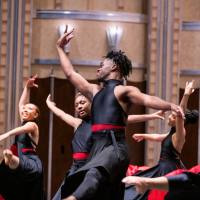On Feb. 24 at the Idea Center, Mohsin Hamid, a Pakistani writer and 2008 winner of an Anisfield-Wolf Book Award, came back to Cleveland to speak on “Literature, Pakistan and ‘The West.'” The lecture was part of the annual series co-sponsored by the Cleveland Foundation and the Baker-Nord Center for Humanities at Case Western Reserve University. ideastream broadcast the lecture via streaming video to the Baker Nord Center and two Cuyahoga County Library sites.
I wish I could reprint Mr. Hamid’s whole lecture here. It was a brilliant example of a fine mind, thinking deeply and out loud. I must be satisfied with sharing some of his comments, furiously scribbled, as I listened. Here, and greatly paraphrased, are some of the things I wanted to particularly remember from his lecture:
About morality, the human condition and what’s real
We have moved certain things into a “religious” sphere of discourse that should, instead, be talked about in the common public realm. We need to have a “secular spiritual” dialogue, as a community of human beings; about death, fear, wonder, evil, justice. We “blinker” ourselves by seeing only left and right. We need to talk more about what is right and what is wrong. Evil comes from an absence of empathy.
About terrorism and censorship
The most effective response to terrorism is bravery. Keep a sense of proportionality. More people are killed in highway accidents than died on 9/11, but we keep driving. There will be other incidents. Hopefully few, but this is no reason to give up freedoms. After 9/11, American writers and news organizations began to self-censor. Hundreds of US writers’ opinions never got circulated.
About the United States and Europe
(Mohsin Hamid holds Pakistani and British citizenship, but has spent more time in the U.S. than anywhere else.)
“When I am here I feel like an American. This is a uniquely American attribute. It is very hard for an immigrant to feel like and be accepted as a European in Europe. Europe still has not moved beyond a collection of tribes. It is a land of European tribes. Europe needs to learn how to let immigrants come and be European. And America needs to learn how not to shut people up in the name of patriotism. The American half of me felt embraced by the election of Barack Obama. I don’t expect him or America to go around the world fixing things. But I do hope to hear him say, ‘This is what we think is right.’”
About Pakistan
Pakistan is half the size of the U.S., with 170 million people. It is a nation of moderate people; poor, but moderate. Religious and ethnic groups go far beyond the narrow division of Sunni and Shiite. There are countless subsets of these, with diverse religious practices and many, many different languages. In this respect, Pakistan is like the United States.
What to do about the conflict
Pakistan’s social structure in the border area with Afghanistan has been undermined. It’s a lot like what happens with drugs and gangs in the inner city. The moderate citizens that give stability to society have been marginalized or killed. The desire for law is important. Activity that looks like war is not going to restore stability and the institutions of law and order. Stop thinking about this as fighting a war and think about it more as how to make life better for the people there.
The disease of nostalgia
“Nostalgia is the desire to live in the time of pre-awareness of mortality – a very comfortable time. We are too vulnerable to politicized nostalgia. It has become a disease. Nostalgic appeals are natural, but dangerous. They don’t get us anywhere.”
